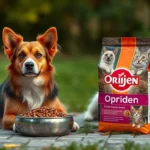
Introduction
Dog nutrition plays a crucial role in the overall health and well-being of our furry companions. A balanced diet helps ensure they grow strong, maintain a healthy weight, and develop properly. For French Bulldog puppies, specific dietary needs and considerations are vital due to their unique genetics and physical characteristics. Understanding these requirements will guide you in selecting the best foods for your French Bulldog puppy, ensuring they receive the nutrients necessary for optimal growth and health.
Understanding the Nutritional Needs of French Bulldog Puppies
Key Nutrients for Growth
When it comes to the best foods for French Bulldog puppies, several key nutrients are essential for their development.
-
Proteins: These are the building blocks for muscle development and are crucial for growth. High-quality protein sources, such as chicken, lamb, and fish, should be included in their diet.
-
Fats: Healthy fats are an important energy source and play a significant role in brain development. Look for foods rich in Omega-3 and Omega-6 fatty acids.
-
Carbohydrates: While not as critical as proteins and fats, carbohydrates provide energy and fiber, which are important for digestive health. Ingredients like sweet potatoes and brown rice are excellent sources.
-
Vitamins and Minerals: Essential for overall health, vitamins and minerals support various bodily functions, including immune system strength and bone health. Look for foods fortified with these nutrients.
Differences Between Puppy and Adult Dog Nutrition
Puppies have different caloric needs compared to adult dogs due to their rapid growth and energy levels. They require more calories per pound of body weight to support their development. Additionally, specific nutrients like DHA (a type of Omega-3 fatty acid) are crucial for brain development in puppies but are less critical for adult dogs.
Best Foods for French Bulldog Puppies
Dry Dog Food (Kibble)
Kibble is often recommended for French Bulldog puppies due to its convenience and dental health benefits. Chewing kibble can help reduce plaque and tartar buildup on teeth.
Recommended brands:
-
Brand A: Known for its high-quality protein sources and absence of fillers, Brand A provides a balanced diet tailored for French Bulldog puppies.
-
Brand B: With a focus on grain-free options, Brand B includes a variety of meat sources and healthy fats, making it an excellent choice for energetic puppies.
-
Brand C: This brand emphasizes natural ingredients and incorporates probiotics for digestive health, essential for French Bulldogs, who can be prone to gastrointestinal issues.
Wet Dog Food
Wet kibble can be beneficial for hydration and may be more appealing to some puppies due to its taste and texture.
Recommended brands:
-
Brand D: Formulated with real meat and vegetables, Brand D offers a nutrient-dense option that appeals to picky eaters.
-
Brand E: This brand focuses on high moisture content and includes no artificial preservatives, making it a healthy choice for hydration.
-
Brand F: Featuring a variety of flavors and textures, Brand F is packed with essential nutrients and is particularly useful for puppies transitioning from nursing.
Raw Diet Options
A raw diet, also known as a biologically appropriate raw food (BARF) diet, consists of uncooked meat, bones, fruits, and vegetables. While some pet owners advocate for raw feeding, it’s important to understand the benefits and risks.
-
Benefits: Proponents argue that raw diets can lead to shinier coats, healthier skin, and improved digestive health.
-
Risks: There are concerns about nutritional balance and the risk of bacterial contamination. Always consult with a veterinarian before starting a raw diet.
Recommended raw food brands or recipes:
-
Brand G: Offers pre-packaged raw meals that are balanced for puppies.
-
Homemade raw recipes: If you choose to prepare raw meals at home, ensure to include a variety of protein sources, vegetables, and supplements to meet nutritional needs.
Homemade Dog Food
Preparing homemade meals can be rewarding and allows for complete control over ingredients. However, it’s crucial to ensure the meals are balanced.
Guidelines for preparing balanced meals:
- Use a variety of protein sources including meats and fish.
- Include vegetables such as carrots and peas for vitamins.
- Add healthy fats from sources like fish oil or flaxseed.
- Incorporate grains or starchy vegetables for carbohydrates.
Sample recipes for French Bulldog puppies:
- Chicken and Sweet Potato Stew: Boil chicken breast and sweet potatoes, add peas and carrots, then simmer until cooked.
- Beef and Rice Bowl: Cook ground beef with brown rice and mix in some chopped carrots and spinach.
Common Ingredients to Look For
High-Quality Protein Sources
When selecting food, look for high-quality protein sources. The first ingredient should ideally be a named meat, such as chicken or lamb.
Healthy Fats
Healthy fats are essential for brain development and skin health. Look for foods rich in Omega-3 and Omega-6 fatty acids, typically found in fish oil and flaxseed.
Digestive Health Ingredients
Digestive health is crucial for French Bulldogs, who can experience tummy troubles.
-
Probiotics and prebiotics: These beneficial bacteria and fibers help support a healthy gut.
-
Fiber sources: Ingredients like sweet potatoes and pumpkin are excellent for promoting healthy digestion.
Foods to Avoid
Harmful Ingredients
Not all ingredients are beneficial for your puppy. Be aware of the following:
-
Common allergens: Many French Bulldogs can be sensitive to grains, dairy, and soy.
-
Toxic foods: Foods like chocolate, grapes, and onions are toxic to dogs and must be avoided at all costs.
Signs of Food Intolerance or Allergies
Watch for symptoms of food intolerance or allergies, including:
- Itchy skin or rashes
- Gastrointestinal upset (vomiting or diarrhea)
- Excessive gas or bloating
If you notice any of these signs, consult your veterinarian to determine the best course of action.
Feeding Schedule and Portion Control
Recommended Feeding Schedule for Puppies
Puppies require frequent feeding due to their high energy needs. A general guideline is:
- 8-12 weeks: 4 meals per day
- 3-6 months: 3 meals per day
- 6 months and older: 2 meals per day
Portion Control Techniques
Portion control is essential to prevent obesity, particularly in breeds prone to weight gain like French Bulldogs. Use measuring cups to ensure accurate portions and refer to the feeding guidelines on your puppy’s food label.
Regularly monitor your puppy’s weight and adjust portions as they grow to maintain a healthy weight.
Supplements for French Bulldog Puppies
When to Consider Supplements
Some puppies may benefit from additional nutrients, particularly if they have specific dietary restrictions or if their food is not meeting all nutritional needs.
Recommended Supplements
Consult with a veterinarian before introducing any supplements. Common supplements for puppies include:
- Multivitamins: For overall health support.
- Fish oil: For skin and coat health.
- Joint support: Especially beneficial for breeds prone to hip dysplasia.
Conclusion
Proper nutrition is fundamental for the health and development of French Bulldog puppies. By understanding their unique dietary needs and selecting the best foods for French Bulldog puppies, you can help ensure they grow into healthy, happy adults. Always consult with your veterinarian for personalized advice tailored to your puppy’s specific requirements. Remember, a well-balanced diet lays the foundation for a lifetime of health and well-being.
This blog post provides a comprehensive overview of dog nutrition, specifically focusing on the best foods for French Bulldog puppies. The content is structured to engage readers while delivering valuable information, ensuring a strong understanding of how to care for these adorable pups.









